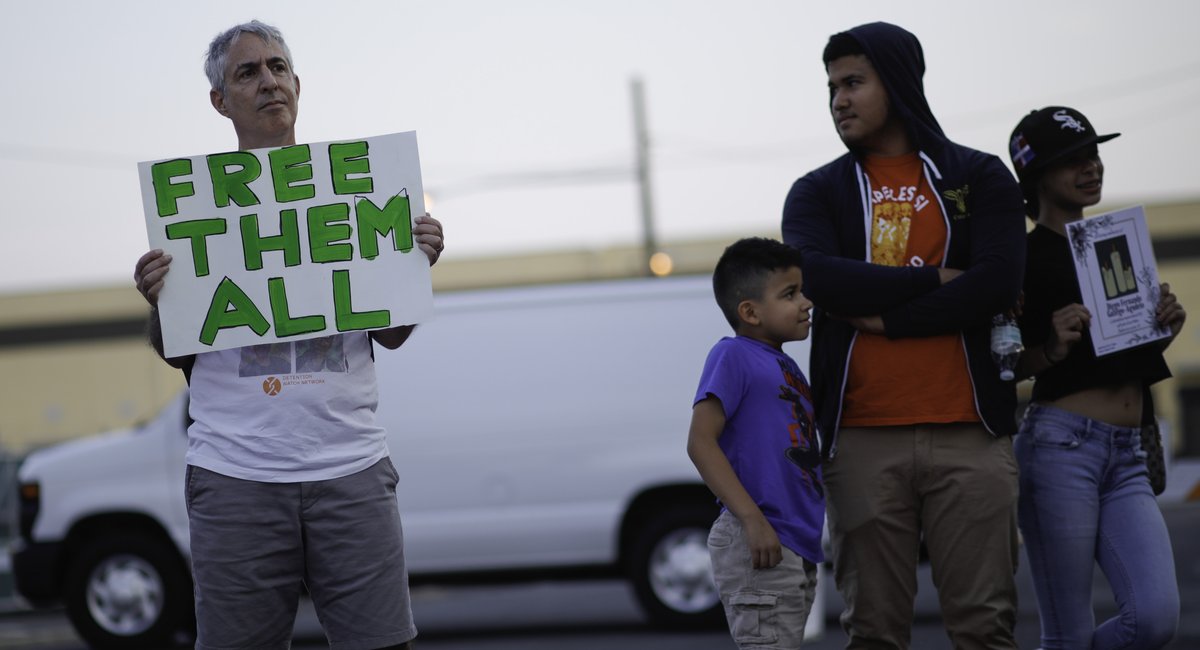The New Jersey chapter of the ACLU and a national Catholic peace organization have joined the state’s legal fight to shut down immigrant detention centers in the state.
The two groups filed a brief this month supporting the New Jersey Office of the Attorney General’s appeal of an August 2023 federal court ruling that blocked the state’s efforts to shutter the Elizabeth Detention Center in Union County — the only remaining immigrant detention center in New Jersey.
Another 27 nonprofit organizations signed onto the brief as well.
“These organizations are united in their support of the state’s power to not renew detention contracts and to prohibit new ones — an important step toward ending the harms of immigration detention in New Jersey,” ACLU staff attorney Molly Linhorst said.
The attorney general’s appeal, also filed this month, argues New Jersey has the right to regulate business in the state, including business officials say harms the health of people in detention.
Faced with press reports of deplorable conditions for detained immigrants in several New Jersey jails, Gov. Phil Murphy in 2021 signed a law barring the public and private operation of federal detention centers for U.S. Immigration and Customs Enforcement. In response, private prison operator CoreCivic filed a lawsuit, with the support of the Biden administration.
Last August, U.S. District Court Judge Robert Kirsch ruled that shutting down the Elizabeth Detention Center would cause chaos for ICE. In his ruling, Kirsch said the facility is part of a national immigration detention system.
Over the last several years, county jails in New Jersey have eliminated their own contracts to house immigrant detainees.
“Troubled by reports of deplorable conditions at private immigration detention facilities, including the facilities’ ‘inadequate medical and mental health care,’ the Legislature extended this general prohibition to private immigration detention,” state Attorney General Matthew Platkin’s office wrote in the filing for its appeal earlier this month.
The ACLU and Pax Christi, the national peace organization of the Catholic Church, filed amicus briefs in support of Platkin’s case. Pax Christi says it has been fighting the Elizabeth Detention Center since 1995, including before CoreCivic ran it.
“People inside the [center] have made it clear that they not only want their freedom but they want this place and all others like it to be closed for good,” said Kathy O’Leary, Pax Christi’s regional coordinator for New Jersey.
The group works under the umbrella of the United States Conference of Catholic Bishops, which argues a profit motive may prevent efforts to rehabilitate incarcerated people, help them develop skills for reintegration, and treat substance abuse.
CoreCivic last year argued that federal statutes take precedence over state law, and the judge in the case agreed. The prison company says the Elizabeth Detention Center is critical to ICE operations in the region because of the facility’s proximity to New York and Newark airports.
But in his appeal, Platkin’s office says the federal judge went too far and that the New Jersey law regulates a business contractor — not an essential function of the federal government.
A CoreCivic spokesman said the company plays a critical role in helping the government provide a crucial service.
“Our sole job has been and continues to be to help the government solve problems in ways it could not do alone — to help manage unprecedented humanitarian crises, dramatically improve the standard of care for vulnerable people and meet critical public safety needs efficiently and innovatively,” the spokesman, Brian Todd, said.
CoreCivic also disputes the claim that conditions are not humane.
“ICE regularly conducts both scheduled and unannounced inspections and audits at our facilities with its staff or with independently contracted monitors. ICE also employs a full-time monitor who is at the Elizabeth facility on a daily basis,” Todd said.
In their amicus brief, the ACLU and other groups support Platkin’s contention that New Jersey has the right and duty to protect incarcerated immigrants in the state from harm.
“From inadequate medical care to the serious mental health consequences arising out of solitary confinement, individuals face threats to their well-being each day they remain in detention,” the brief says. “Given these significant concerns, the state’s decision to limit immigration detention advances its strong interest in protecting the public health.”

Leave a Reply